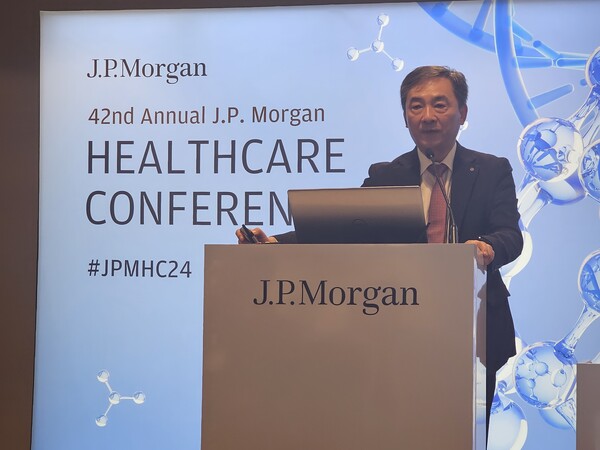SAN FRANCISCO, Calif.— By Lee Han-soo, Korea Biomedical Review correspondent -- Yuhan Corp. aims to catch the eye of foreign investors and potential drug development partners at the J.P. Morgan Healthcare Conference (JPMHC) 2024 by unveiling its ambitious drive to become one of the top 50 global pharmaceutical companies.
At this year’s commencement ceremony, Yuhan Corp. CEO Cho Wook-je declared the goal of launching the second and third versions of its successful new drug, Leclaza, a non-small cell lung cancer (NSCLC) treatment, to enter the rank of the global top 50 pharma company.
At the JPMHC’s Asia Pacific & Latin America (APAC&LatAm) session, Yuhan Corp. R&D President Kim Yeol-hong further detailed this ambition.

Kim outlined a plan to launch at least two innovative drugs into the global market by 2026, aiming to achieve sales of 4 trillion won ($3 billion) and an operating profit of 400 billion won.
"The confidence in Yuhan's global competition stems from its notable successes, particularly with Leclaza," Kim said. "Leclaza, developed in collaboration with Johnson & Johnson, has achieved promising clinical results."
As a result, it has been licensed as a first and second-line therapy in Korea and is awaiting approval in the U.S. and Europe, with an expected launch in the latter half of the year, Kim added.
Yuhan Corp. stressed that the combination therapy involving Leclaza is projected to generate a minimum annual revenue of $5 billion.
Kim stressed that Yuhan's return to JPHMC is especially important as five years have passed since its initial recognition for exporting Leclaza technology at a past JPHMC conference in 2018.
"Aside from Leclaza, Yuhan is actively developing other promising drugs, including immunotherapy agent YH32367 and allergy treatment YH35324," Kim said. "The latter has shown significant potential in inhibiting IgE, a key factor in allergies, compared to Novartis's Xolair."
Besides, Yuhan anticipates the emergence of more innovative drugs, including YH25724, a nonalcoholic steatohepatitis (NASH) treatment exported to Boehringer Ingelheim in 2019, Kim added.
With 17 executives, Kim stressed that Yuhan is set to engage in over 60 meetings related to global licensing and collaboration.
Yuhan to lead Korea's open innovation ecosystem
Kim explained that the development of Leclaza and forward candidates is rapidly evolving into a leader in innovative drug development thanks to its successful open innovation strategy.
"The company is at the forefront of change, leveraging open innovation to transform the pharmaceutical landscape," Kim said. "Central to our strategy is the Yuhan Innovation Program (YIP), which focuses on acquiring core technologies from leading universities and research institutes."
Kim added that this approach allows Yuhan to build a competitive pipeline quickly in collaboration with various domestic biotech firms.
The pipeline includes promising drugs like YH32367, licensed from ABL Bio, and YH35324, licensed from GI Innovation.
"These drugs, currently in phase 1 clinical trials, demonstrate Yuhan's commitment to groundbreaking research and development," Kim said. "Yuhan's global open innovation strategy also extends beyond Korea, connecting with key markets in the U.S., Australia, and Europe."
He added that this international collaboration underscores the company's dedication to significantly impacting the global market.
Kim also highlighted Yuhan's other strategy, which includes contract development and manufacturing organization (CDMO) services focused on high-quality chemical synthesis of active pharmaceutical ingredients (APIs).
"This strategic direction, in collaboration with its subsidiary Yuhan Chemical and international business units, aims to heighten global competitiveness through advanced manufacturing and research capabilities, he said.
Related articles
- [JPM 2024] Kakao Healthcare aims to go global with diabetes management, clinical data analysis
- [JPM 2024] Samsung Biologics showcases robust performance in 2023, rosy picture for 2024
- [JPM 2024] Lotte Biologics unveils bio-plant plans at J.P. Morgan Healthcare Conference
- [JPM 2024] Flagship Pioneering's Berenson discusses biopharma collabo with Samsung
- [JPM 2024] Revitalized investment sentiment to bring about more M&A deals in 2024
- [JPM 2024] Eldest son of Celltrion chief makes international debut at JPM 2024
- [JPM 2024] Celltrion will keep developing, manufacturing biosimilars until everyone has access to medication: founder
- [JPM 2024] GC Cell CEO reveals ambitious plans for global expansion and innovation in CGT
- [JPM 2024] JP Morgan Asia investment head's advice on navigating the future of healthcare investment
- Yuhan cruises in global markets, looking forward to 2 years from now
- Yuhan Corp. marks record sales on tech export revenue in 2023
- Yuhan CEO Cho, key driver behind Leclaza success, will likely serve another term

